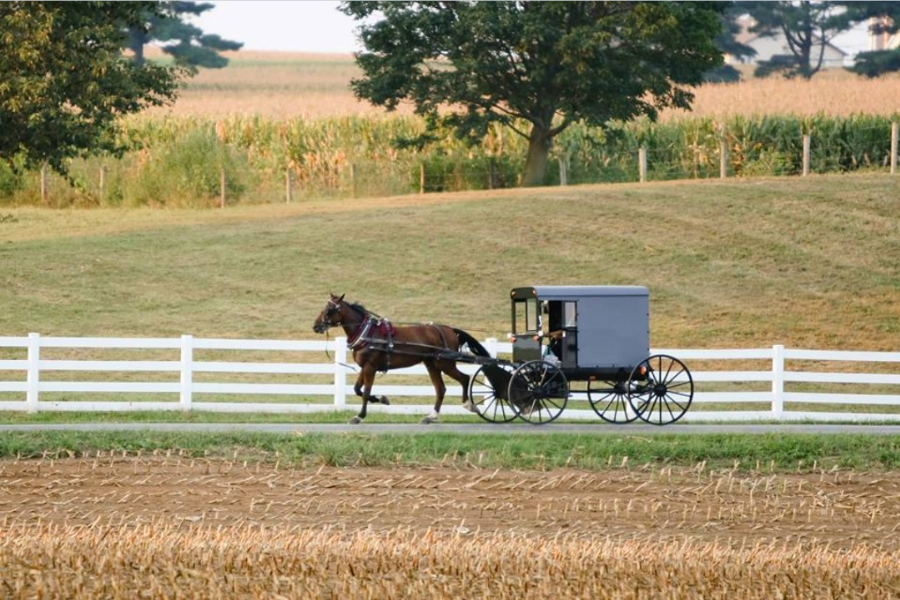Amish Oil Change: Unveiling the Meaning and Traditions

Introduction
The term “Amish oil change” refers to a distinctive and traditional way of changing the oil in vehicles, a practice deeply rooted in the Amish community’s values. The Amish have always lived by a simple and sustainable lifestyle, cherishing self-sufficiency and minimalism. This philosophy also extends to how they maintain their vehicles, including the unique way they handle oil changes.
The Amish Way of Life
Before immersing oneself into the time-honored Amish oil change custom, it is imperative to comprehend the extensive tapestry of Amish existence. The Amish, a Christian sect, have gained renown for their unwavering commitment to an austere and unembellished way of life. They adhere to a code of conduct, denominated as the “Ordnung,” which presides over diverse facets of their quotidian being, encompassing their attire, personal grooming, interaction with technology, and modes of locomotion.
The Amish have earned widespread recognition for their calculated abstention from contemporary innovations, and this principle extends to their selection of conveyances. Predominantly, Amish communities place their reliance upon horse-drawn carriages for transportation, albeit, on occasion, they may employ mechanized vehicles, albeit with certain distinctive attributes.
The Amish Oil Change
The term “Amish oil change” doesn’t refer to a conventional vehicle maintenance procedure like you might find at a typical auto repair shop. Instead, it symbolizes the Amish approach to vehicle maintenance and the values they hold dear.
- Simplicity and Self-Reliance: The Amish treasure simplicity and self-sufficiency. They don’t just view vehicle maintenance as a chore; it’s a reflection of their whole way of life. They prefer to handle oil changes themselves, using manual tools and traditional methods, underlining their commitment to self-sufficiency and minimalism.
- Community Involvement: The Amish oil change is a communal effort. Within their tight-knit communities, they often join forces to help each other with tasks, including vehicle maintenance. This communal approach showcases their strong sense of togetherness and mutual support. Working on each other’s vehicles fosters trust, cooperation, and a genuine sense of community.
- Resourcefulness: Resourcefulness is a hallmark of Amish life. They extend this philosophy to vehicle maintenance by using locally sourced and sustainable materials whenever possible. In some instances, they even recycle or repurpose parts from older vehicles to keep their cars and trucks running, making the most of what they have.
- Minimal Environmental Impact: Just like in other aspects of their lives, the Amish oil change method treads lightly on the environment. By avoiding unnecessary waste and adhering to a simpler approach to vehicle maintenance, they reduce their ecological footprint, aligning with their deep commitment to the responsible stewardship of the Earth.
The Meaning of Amish Oil Change
An Amish oil change is all about keeping a vehicle running smoothly, but it’s done in a way that’s a far cry from your usual auto shop experience. Instead of modern gizmos and gadgets, the Amish put their trust in old-fashioned manual skills and basic tools, embracing a truly hands-on approach to vehicle upkeep.
While the specific stages in an Amish oil change could differ from community to community, the general procedure is usually as follows: the old oil is drained from the engine, the oil filter is replaced, and new oil is added. The best part is that they manage to accomplish all of this with very little use of electricity, machinery, or the specialty tools you might find in a conventional garage. It’s a characteristically Amish fusion of thrift and simplicity.
Benefits of Amish Oil Change
The Amish oil change method comes with a bunch of great perks. It all starts with being self-sufficient and developing a genuine bond with your car. The Amish treat their cars like they are having a one-on-one conversation when they get their hands dirty changing the oil. They get to know the ins and outs, spotting any sneaky problems early on, just like how businesses do some detective work in account reconciliation to catch financial slip-ups. A strong sense of independence and self-reliance is also imparted to them, which is important to their way of life.
However, it doesn’t end there. Their entire strategy also fits in nicely with their dedication to maintaining sustainability and simplicity. By using as little electricity and fancy tools as possible, they’re shrinking their carbon footprint and being kind to the environment. Additionally, they save money since they avoid the expenses associated with hiring an expert. Everyone wins in this situation.
Conclusion
The practice of the Amish oil change is undeniably distinctive, akin to a living manifestation of Amish philosophy. It stands as a tribute to their dedication to simplicity, self-sufficiency, and environmental stewardship. When they engage in this oil-changing ritual, they employ age-old, manual craftsmanship and rudimentary implements, not only ensuring the optimal functioning of their vehicles but also treading lightly upon the ecological realm.
Therefore, encountering the term “Amish oil change” serves as a poignant reminder of these commendable principles. In an era increasingly reliant on technology, it offers a valuable lesson in reverting to fundamental values and remaining steadfast to what holds true significance.
Summary:
Discover the unique tradition of the “Amish oil change” and its profound meaning in the Amish community’s way of life. This article explores the values of simplicity, self-sufficiency, and environmental stewardship that underlie this distinctive approach to vehicle maintenance. Learn how the Amish oil change reflects their commitment to manual craftsmanship, resourcefulness, and community involvement while minimizing environmental impact.
Facts:
- The Amish oil change is a traditional approach to vehicle maintenance deeply rooted in the Amish way of life.
- The Amish live by a code of conduct called the “Ordnung,” which guides various aspects of their daily existence, including vehicle usage.
- While the Amish primarily use horse-drawn carriages for transportation, they may occasionally use mechanized vehicles with unique attributes.
- Simplicity and self-sufficiency are core values of the Amish, reflected in their hands-on approach to oil changes.
- The Amish oil change is a communal effort, emphasizing their strong sense of togetherness and mutual support.
- Resourcefulness is a hallmark of Amish life, and they extend this philosophy to vehicle maintenance by using locally sourced and sustainable materials.
- The Amish oil change method aims to reduce the ecological footprint by avoiding unnecessary waste and adhering to a simpler approach.
- The procedure typically involves draining old oil, replacing the oil filter, and adding new oil with minimal use of electricity or machinery.
- Amish individuals develop a strong bond with their vehicles, gaining a deep understanding of their maintenance needs.
- The Amish approach to vehicle maintenance aligns with their commitment to sustainability, simplicity, and self-reliance.
FAQ
What is the Amish oil change?
The Amish oil change refers to a distinctive approach to vehicle maintenance deeply rooted in the Amish community’s values of simplicity, self-sufficiency, and environmental stewardship. It involves changing the oil in vehicles using manual tools and traditional methods, reflecting their commitment to minimalism.
How does the Amish way of life influence their vehicle maintenance practices?
The Amish way of life, characterized by simplicity and self-sufficiency, influences their vehicle maintenance practices by emphasizing a hands-on approach. They prioritize manual craftsmanship and resourcefulness, avoid unnecessary waste, and minimize their ecological footprint.
What values do the Amish prioritize in their approach to oil changes?
The Amish prioritize values of simplicity, self-sufficiency, community involvement, resourcefulness, and minimal environmental impact in their approach to oil changes. It’s a reflection of their broader way of life.
How do Amish communities support each other in vehicle maintenance?
Amish communities often engage in communal vehicle maintenance, including oil changes. They come together to help each other, fostering trust, cooperation, and a genuine sense of community.
What materials and tools do the Amish use for oil changes?
The Amish use manual tools and traditional methods for oil changes, avoiding the use of electricity and specialized machinery whenever possible. This may include wrenches, oil pans, and basic hand tools.
How do the Amish minimize their environmental impact during oil changes?
The Amish minimize their environmental impact during oil changes by avoiding unnecessary waste and adhering to a simpler approach. They may use locally sourced and sustainable materials and recycle or repurpose parts from older vehicles.
What are the primary steps in an Amish oil change?
The primary steps in an Amish oil change typically involve draining old oil from the engine, replacing the oil filter, and adding new oil. These steps are accomplished with manual tools and traditional techniques.
How does the Amish approach to vehicle maintenance contribute to self-sufficiency and independence?
The Amish approach to vehicle maintenance fosters self-sufficiency and independence by empowering individuals to take care of their own vehicles. It encourages a strong bond with the vehicle, allowing for early problem detection and reduced reliance on experts.
What are the environmental benefits of the Amish oil change method?
The environmental benefits of the Amish oil change method include reduced ecological footprint due to minimal waste and a simpler approach to vehicle maintenance. This aligns with the Amish commitment to responsible stewardship of the Earth.
Do the Amish save money by handling their own oil changes?
Yes, the Amish save money by handling their own oil changes. They avoid the expenses associated with hiring experts or using specialized equipment, contributing to their self-sufficiency and frugal lifestyle.






